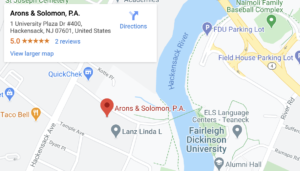Bergen County Collaborative Divorce Attorney

Some divorcing couples value their mental health. Others desire a cost-effective resolution to family law matters.
To take control of their divorce, they can use the collaborative divorce process.
For years, our experienced collaborative divorce attorneys have served Bergen County, NJ, families. At Arons & Solomon Divorce Lawyers, our experienced attorneys focus their practices on divorce law.
We are skilled in alternative dispute resolution techniques, including mediation and arbitration.
Your choice of a divorce lawyer can determine whether you achieve your goals. If you desire a low-conflict settlement agreement, your choice is critical. Choose a family law attorney with extensive experience in your attorney-client relationship.
Reach out to Arons & Solomon Divorce Lawyers today at (201) 487-1199. Our Bergen County divorce lawyers handle each case with a personal touch and attention to detail.
Table of Contents
What Are the Goals of the Collaborative Divorce Process?
In a collaborative divorce, the parties focus on polite interactions and creative solutions. Divorcing couples mutually agree to keep settlement negotiations confidential. They commit to open communication and voluntary exchange of information.
Ordinarily, each spouse’s lawyer would only communicate with that spouse. But the collaborative divorce process is different. In a collaborative divorce, the conversation is among both spouses and their attorneys. It can include neutral professionals on the collaborative divorce team.
In a collaborative divorce, divorcing couples are encouraged toward non-adversarial conflict resolution. The collaborative divorce team focuses its energy on inventive solutions. Collaborative divorce meets the needs of the divorcing couple and their family.
What Issues Can Be Resolved Through the Collaborative Divorce Process?
Divorcing couples can resolve most issues using the collaborative divorce process. Issues that can be resolved through the collaborative divorce process include:
- Child custody (parental responsibility and time-sharing)
- Child support
- Parental relocation
- Alimony
- Division of assets (equitable distribution)
- Implementation of pre-nuptial or post-nuptial agreements
Arons & Solomon Divorce Lawyers focuses its practice on New Jersey family law. As a result, we can handle all aspects of a divorce in a collaborative divorce process.
Child Custody and Child Support
In New Jersey, divorcing couples with children must have a Parenting Plan. Parenting plans must address parental responsibility and time-sharing.
For children with special emotional or mental health needs, parenting plans can serve other purposes.
They can outline healthcare and medical decision-making processes for the parents to use.
In the collaborative divorce process, mental health professionals consult individually with each parent. They help divorcing couples develop a plan in the best interest of the child. Child specialists can also help resolve disputes over parental relocation.
Child support, or financial support of the child, is also addressed by a parenting plan. In a collaborative divorce, spouses agree to a full exchange of all information. Particularly, spouses must produce information related to their finances.
In New Jersey, child support is calculated using the New Jersey Child Support Guidelines. The amount on the Guidelines is often the amount agreed upon in mediation.
But, families can deviate from the Guidelines to meet the family’s needs. For example, to allow for college tuition or other expenses to meet a child’s educational needs.
Many divorcing couples in high net-worth divorces want to keep their finances private. Collaborative divorce allows for this privacy.
Alimony
Alimony, or spousal support, is money paid by one spouse to the other spouse. Alimony helps the receiving spouse stay in the lifestyle they enjoyed during marriage. In New Jersey, the amount of alimony, and the length of time it is paid, depends on the length of the marriage.
The right to receive alimony can end on the occurrence of a certain event. In New Jersey, the receiving spouse’s remarriage can end the right to alimony.
In some instances, either partner can ask to end or change alimony. Such instances include when a terminating event occurs or financial circumstances change.
A financial professional can build an alimony schedule that works for both parties. The spouse receiving alimony may be able to increase their earning potential through education or job training.
Alimony can be designed to support the spouse through their education or job training. Once the education or job training is complete, the alimony may end by mutual agreement.
Dividing Property and Debts
New Jersey courts use the principle of equitable distribution to divide marital property. Marital property is property purchased during the marriage. Marital property is divided fairly, under the principle of equitable distribution. But, it is not necessarily divided equally.
New Jersey courts consider several factors when dividing debt in divorce. The factors try to account for all relevant information about the fairest way to split debts.
But, in some cases, parties may be willing to compromise on the division of property and debt. Our collaborative divorce attorneys help clients reach optimal settlement agreement terms.
Collaborative Divorce Team Players
The collaborative divorce process is a team effort. Divorcing couples should understand who will be on the team and each player’s role in the process.
Collaborative Divorce Attorneys
The collaborative divorce process is designed to be non-adversarial. But, both parties are still entitled to know the law as it applies to their case. An experienced family law attorney can offer their client legal advice throughout.
Collaborative divorce attorneys ensure adherence to the commitment of transparency. At Arons & Solomon Divorce Lawyers, our diplomatic family law attorneys know how to get full disclosure. We have the tact and discretion to get the needed information.
In a collaborative divorce, both attorneys agree to withdraw from the case if mediation breaks down. For all involved, this agreement is a strong motivator to compromise.
Certified Financial Planner
Divorcing couples may use a Certified Financial Planner in their collaborative divorce.
Certified Financial Planners can help parties maximize the value of their assets.
Certified Financial Planners calculate the amount of alimony needed for a spouse to finish education or job training.
Certified Financial Planners assist in the division of complicated financial interests.
Mental Health Professional
Mental health professionals can support multiple efforts in the collaborative divorce process. Divorcing couples may want to avoid the adversarial court-ordered custody evaluation. But, when there are mental health concerns, a mental health professional can help.
Mental health professionals can counsel the parties in collaborative divorce. They can also counsel the children of divorcing couples. Mental health professionals may also make recommendations related to child custody.
Child Specialists or Parenting Consultants
Child specialists or parenting consultants support the family bonds. Choosing collaborative divorce lessens the emotional stress of traditional divorce and dissolution litigation.
Divorcing couples may need help in implementing their admirable goals. Disputes will inevitably arise in co-parenting. Parenting consultants help parents develop methods to resolve them.
How Does Collaborative Divorce Process Work?

The collaborative divorce process unfolds over a series of meetings. The collaborative divorce team tailors the meetings to meet the needs of divorcing couples.
A typical collaborative divorce process includes:
- Information-gathering sessions
- Outside “homework” for the parties
- Individual consultations between each party and the neutral professionals
Outside of the team meetings, we work with our clients to help them understand the law and a strategy that focuses on their needs.
The collaborative divorce process is issue-based and not position-focused. When parties and professionals focus on how to resolve the issues in a way that satisfies each party’s “why,” innovative solutions come about. In an open and honest process, each party gains confidence in the agreed-upon solution.
Is a Collaborative Divorce Right For You?
Protracted and contentious divorce litigation is messy and can be disheartening for all involved. Family law matters are difficult and emotional by their very nature. Collaborative divorce may not be suitable in all cases.
Choosing the Collaborative Divorce Process
If you’re considering a collaborative divorce, you should reach out to Arons & Solomon Divorce Lawyers. The collaborative divorce process helps divorcing couples to minimize arguments and negativity. Often, the goal is to maintain a co-parenting relationship.
A family law attorney with experience using the collaborative divorce process can advise you whether it’s likely to work in your case. Some cases in which collaborative divorce may not work include:
- Cases where divorcing couples harbor resentment, such as in cases of adultery.
- Cases where domestic violence is involved, due to the power dynamics of abuse.
- Cases where one spouse has full control over the finances.
When the issue is the potential for hidden assets, a forensic accountant can help ease the tension. Hiding assets in a divorce is punishable under New Jersey law. In cases of adultery or domestic violence, collaborative divorce may not be advisable.
The collaborative divorce process, when it works as intended, saves save time, money, and emotional energy. But, if a spouse has a history of dishonesty, it may be futile to attempt a collaborative divorce.
Representing Clients in Collaborative Divorce Proceedings Across Bergen County
Arons & Solomon Divorce Lawyers is proud to represent clients in collaborative divorce matters throughout Northern New Jersey. We regularly handle these types of cases for clients in:
- Teaneck
- Englewood
- Ridgewood
- Tenafly
- Franklin Lakes
- Upper Saddle River
- Allendale
- Old Tappan
- Hohokus
- Saddle River
- And other areas
Contact our law offices, conveniently located in Hackensack and Madison, to discuss your legal options today.
Contact Our Bergen County Collaborative Divorce Attorneys For Help
At Arons & Solomon Divorce Lawyers, we use our experience with the collaborative divorce process to help Bergen County, NJ families. We can help you decide whether collaborative divorce is an option in your case.
Reach out to our law firm today. We are ready to advise you about your legal options, the collaborative divorce process, and how our firm can help you.
Arons & Solomon Divorce Lawyers also provides:
- Divorce Lawyers in Bergen County, NJ
- Bergen County, NJ Child Custody Lawyers
- Bergen County, NJ Child Support Lawyers
- Spousal Support Lawyers in Bergen County, NJ
- Prenuptial Agreements Lawyers in Bergen County, NJ
- LGBT Divorce Lawyers in Bergen County, NJ
- Postnuptial Agreements Lawyers in Bergen County, NJ
- Paternity Lawyer in Bergen County, NJ
- Property Division in Bergen County, NJ
Visit Our Divorce & Family Law Firm in Hackensack, NJ
Arons & Solomon Divorce Lawyers – Hackensack Office
1 University Plaza Dr Suite 400, Hackensack, NJ (07601)
(201) 487-1199



